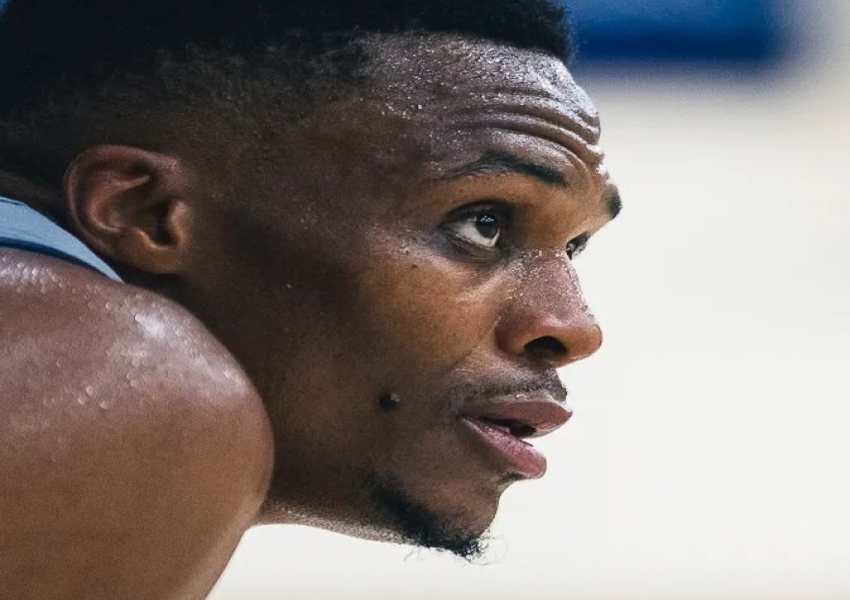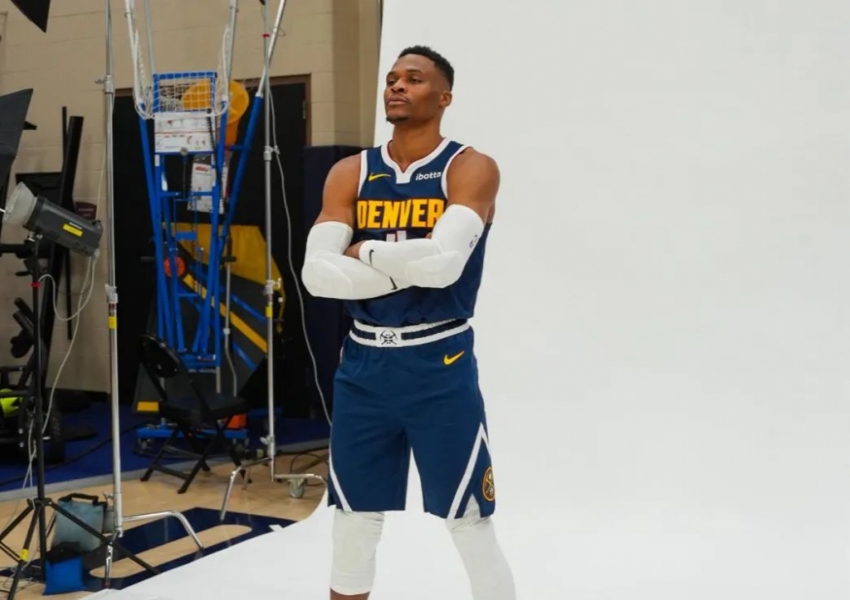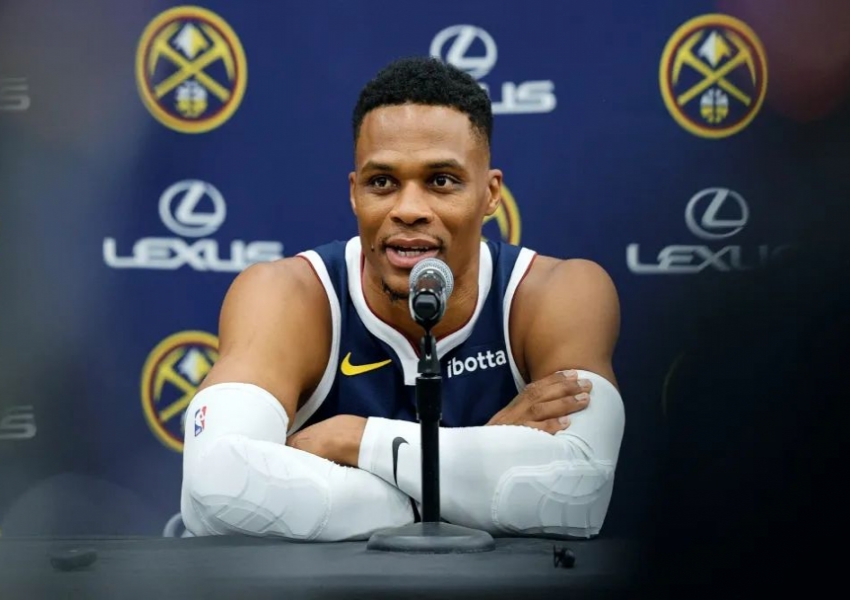Still Trying to Be Himself? Westbrook's Words Signal Trouble for the Nuggets!
Russell Westbrook, once known as one of the most dynamic players in the NBA, has once again found himself in the spotlight—this time due to his comments during the Denver Nuggets' first day of training camp. When asked by a reporter whether the Nuggets' system allows him to showcase his unique skill set more than his previous stints in Los Angeles, Westbrook's response was blunt: “To be honest, I’ve always been one-of-one. They just didn’t put me in a position that allowed me to be unique. I wasn’t even playing in my real position.”

This statement has sparked reactions across social media and from journalists, many of whom were quick to criticize Westbrook’s unwillingness to adapt. Shane Young, a reporter covering the Phoenix Suns, sarcastically tweeted: “Ah, I get it now. So, it’s the Rockets’, Wizards’, Lakers’, and Clippers’ fault. Every year, it’s the same story.” Kevin O’Connor, a well-known NBA journalist, shared a picture of Westbrook being left wide open by defenders, captioning it, “Let Russ be Russ.” The top comment under the interview read: “He said the same thing when he went from the Lakers to the Clippers. Now, it’s the same story with the Nuggets. When will people wake up?”

These reactions reflect the broader skepticism about Westbrook's ability to fit in with a team-oriented approach, especially given the shortcomings he has shown in recent years. When Westbrook initially joined the Clippers, he made similar remarks, saying, “The Clippers believed in me from day one. They allowed me to be myself.” However, with each new opportunity, it seems the results remain the same, raising questions about whether Westbrook’s style of play can still be effective in today’s NBA.

Westbrook's Rocky Journey
Westbrook’s NBA career has been a rollercoaster of extreme highs and deep lows. At his peak, he was a triple-double machine and the league’s MVP in 2017. However, his career has been on a steep decline since then, with stops in Houston, Washington, Los Angeles (Lakers), and the Clippers—all of which ended in disappointment.
This offseason, Westbrook agreed to a buyout with the Clippers and signed a two-year, $6.8 million contract with the Nuggets, a move that sparked debate. Supporters of the signing argued that Denver had lost key players in the offseason, including Kentavious Caldwell-Pope and Bruce Brown, and that they needed depth off the bench. Given Westbrook’s versatility, ability to grab rebounds, and playmaking, some believed he could bring a spark to the Nuggets’ second unit. His energy and passion, combined with a low-risk contract, made him seem like a worthwhile gamble.
However, critics were quick to point out Westbrook's glaring flaws, particularly his inability to shoot consistently. Throughout his career, Westbrook has struggled with efficiency, and opposing defenses have often dared him to shoot, especially from beyond the arc. If Westbrook shares the floor with Nikola Jokić, the Nuggets’ star center, there is concern that he could become a liability rather than an asset. Jokić thrives on spacing and ball movement, and Westbrook’s poor shooting could clog the offense, making it easier for opposing teams to neutralize Denver's attack.
Additionally, Westbrook has always been ball-dominant, and turnovers have plagued him throughout his career. These issues—poor shooting, turnovers, and his insistence on playing his way—are why his past stints with the Lakers and Clippers were filled with inconsistency and frustration. His defenders may point to his passion and competitiveness, but the reality is that Westbrook’s style of play often leads to inefficient results.
The Stats Tell the Story
Westbrook’s numbers over the past few seasons paint a clear picture of his struggles. Last season with the Clippers, Westbrook played 68 games, averaging 11.1 points, 5.0 rebounds, and 4.5 assists. Those numbers might seem decent, but his shooting percentages were concerning: 45.4% from the field, a dismal 27.3% from three-point range, and 68.8% from the free-throw line. His true shooting percentage was just 51.4%, well below league average.
Things got even worse during the playoffs. In six games, Westbrook’s numbers plummeted. He averaged just 6.3 points, 4.2 rebounds, 1.7 assists, and 1.7 turnovers per game, shooting a horrific 26.0% from the field, 23.5% from three, and 61.5% from the free-throw line. His true shooting percentage in the playoffs was an abysmal 34.1%, numbers that would be unacceptable for a role player, let alone a former MVP.
Westbrook’s shooting struggles have become such a liability that ESPN’s Brian Windhorst bluntly said in a recent interview, “To be honest, I wouldn’t let him shoot any more threes.” While completely banning Westbrook from shooting threes may seem extreme, it highlights just how problematic his shot has become. His inefficiency, especially in today’s NBA where floor spacing is critical, can cripple a team’s offense.
The Nuggets’ Dilemma
The Denver Nuggets are now faced with a crucial challenge: how to properly use Westbrook without disrupting the chemistry that brought them a championship last season. Jokić, Jamal Murray, Michael Porter Jr., and Aaron Gordon form a talented core that works seamlessly together. If Westbrook tries to impose his style on the Nuggets' offense, it could spell disaster, especially since Jokić thrives on ball movement and floor spacing.
Ideally, Westbrook would play primarily with the second unit, where he could dominate the ball more freely without interfering with the Nuggets’ starters. In this role, Westbrook could provide the bench with scoring, rebounding, and playmaking, while limiting the damage his inefficiencies might cause. However, even in this scenario, he would need to reduce his turnovers and avoid his tendency to “play hero ball,” where he forces bad shots or tries to do too much.
If Westbrook can accept a reduced role and focus on his strengths—attacking the rim, facilitating, and playing with energy—he might still be able to make a positive impact. However, given his history of reluctance to change, there are legitimate concerns about whether he will adapt. If Westbrook insists on “being himself,” as he mentioned in the interview, it could undermine the Nuggets’ chances of repeating as champions.
The Clock Is Ticking
For Westbrook, the 2023-24 season could be make-or-break. At 35 years old, and with his athleticism declining, he can no longer rely solely on his physical gifts. If he fails to adapt and continues to insist on playing the way he has in the past, he may find himself without a team next offseason. It’s not an exaggeration to say that this could be his last chance to remain a relevant player in the NBA.
Despite his numerous flaws, Westbrook still has plenty to offer if he can shift his focus. He remains a capable rebounder and playmaker, and his competitive fire is undeniable. However, to succeed in Denver, he must prioritize the team’s needs over his desire to “be himself.” The Nuggets need him to be a role player, not a star, and the sooner he accepts that, the better his chances of contributing to their success.
As the new season begins, all eyes will be on Westbrook and how he fits into Denver’s system. His comments have already raised concerns, and if he doesn’t change his approach, the Nuggets could be in for a challenging year. Westbrook may want to “do him,” but for the sake of the team—and his career—he’ll need to find a way to balance his individuality with the needs of the team.
Copyright Statement:
Author: focusnba
Source: FocusNBA
The copyright of this article belongs to the author. Reproduction is not allowed without permission.
Recommended Blog
- Anthony Edwards Joining the Warriors? Golden State's Fast-Tracked Trade Could Secure the NBA's Next Superstar
- Farewell to a Legend: 10 Key Memories of Dikembe Mutombo
- 7-for-1! Could the Thunder Move Quickly to Land Giannis? Another Wild NBA Trade in the Making
- Unbelievable! Pelicans’ 7-for-1 Trade Proposal for Anthony Davis? Another Outrageous NBA Trade Scenario
- Steep Decline! Did This Trade Ruin 35-Year-Old Bojan Bogdanović’s Career?
- It's All Gone! Farewell Dwight Howard: Leaving the NBA as a Laker…
- Built Like Zion! Celtics Are Thrilled: The True Team Leader Has Arrived…
- He’s Married! Hu Jinqiu Scores 42 Points and 22 Rebounds in Asian Qualifiers – Is He the Future of China’s Frontcourt?
- Leonard Out for the Season? Clippers Poised to Tank for 2025 Top Prospect
- Knee Surgery! Is Championship Role Player Bruce Brown Worth a First-Round Pick?